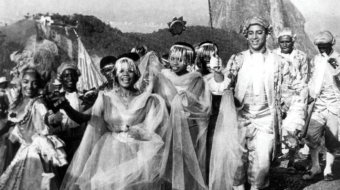
Excessive self-indulgence is the byword of Paolo Sorrentino’s new film Loro. The subject invites it: Silvio Berlusconi (Toni Servillo), the unscrupulous, crass entrepreneur, one of the world’s richest, turned politician and prime minister of Italy. Look up the word “womanizer,” and there’s his picture on the page, right next to Harvey Weinstein and Jeffrey Epstein. Many of the film’s 156 minutes salaciously engage the heterosexual male gaze with Fellini-esque scenes of decadent villa weekends crammed with sensuously commingling female bodies and all the cocaine you could possibly want, sniffed up joylessly through tight cylinders of crisp Euro notes.
The length of the film is testament to the oversized nature of the biographical subject. I couldn’t even make it through the credits before getting out of my seat to address my personal needs. But American viewers, take heart: The Italian version is over an hour longer!
Loro means “them” or “the others” in Italian. It becomes the title of the film because it’s not only about “Lui, Lui” (the godlike “Him”) but about all the servants, staff, hangers-on, sycophants, self-abasers, self-promoters, and ambitious courtiers who prop him up in hopes of taking away some of his aura. (Loro is also a pun: Just hearing the title, one might think “l’oro,” the Italian word for gold.) Shame does not seem to be a concept this crowd knows. Women can be schemers and opportunists themselves, of course, but mostly this is a collective portrait of female objectification.

Silvio Berlusconi started out, with a little help from his daddy, as a tycoon in housing development. Ah, Reader, I know you are already thinking “Donald Trump,” and for sure the film draws out a host of parallels between these two paragons of late stage capitalism—the entertainment business, the beauty pageants, the sports teams, the multiple marriages and kids, the corruption, fraud and cheating, the lawsuits, the tacky esthetic taste, the borderline personality, the predatory sex, the uncanny salesmanship of a faux-patriotic populist brand of politics, and the flirtation with fascism. Not to mention the hair.
Famous in Berlusconi’s sordid reputation were his assignations with way-underage girls (read: children), but for some reason Sorrentino and his co-writer Umberto Contarello decided not to go there.
Timed as the release of this film is, the comparison—and the warning, a year or so out from the 2020 U.S. elections—cannot be coincidental, although it folds in many fictional characters and situations alongside the real-life people in Berlusconi’s world to fill in the script around the grotesque protagonist.
Silvio Berlusconi served as prime minister of Italy in four governments, under the banner of his angry, racist Forza Italia party. The film takes place during the years 2006-09. Much of the personal drama involves his second wife Veronica Lario (Elena Sofia Ricci) at a time, after 25 years of marriage, when she has finally had enough, while the pretenders around him are compressed into the pathetic leading character of Sergio Morra (Riccardo Scamarcio), who to my eye looks a lot like former Mexican President Enrique Peña Nieto, another paragon of a neoliberal politician.
“Having it all isn’t enough,” the tycoon says. When we meet the dissolute Berlusconi he has already turned 70 and yet is still hungry to get back into power. Which he does though a skillful rearrangement of the balance of political forces in government achieved by blatant and humorously enacted payoffs. In one exceptionally clever bit of cinematography, Sorrentino has the old lion discussing the bribery plan (“altruism is the best way to be selfish”) with former business partner Ennio Doris, whom Toni Servillo also plays!
A year after Berlusconi takes his oath of office, an earthquake all but levels the town of L’Aquila. As figurehead of the nation he makes a big show of visiting the disaster zone (a victim of slack enforcement of building codes, as if you couldn’t have guessed). The homeless townspeople are later seen entering the new dwellings that Berlusconi built for them. Much is made of the firefighting and excavation crew recovering a beloved marble statue of Jesus from a destroyed church. The metaphor suggests that the eternal genius of the Italian people and culture will miraculously survive any catastrophe. The filmmaker focuses his attention on the tired, ashen faces of the hardworking firefighters, and ends, over the final credits, with a peaceful shoreline soundtrack of gentle ocean waves and crying seagulls that know nothing of earthly politics.
In the meantime—it’s not in the film—Berlusconi is still around. He’ll be 83 in September 2019. He has served as a member of the European Parliament since July 2019, and occasional news reports surface suggesting that he is still angling somehow to take advantage of Italy’s fragile governmental system to get back in play. This is one phoenix that never seems to stop rising.
Loro opens in in theaters September 20, with video formats available September 27.
The trailer can be viewed here.












Comments